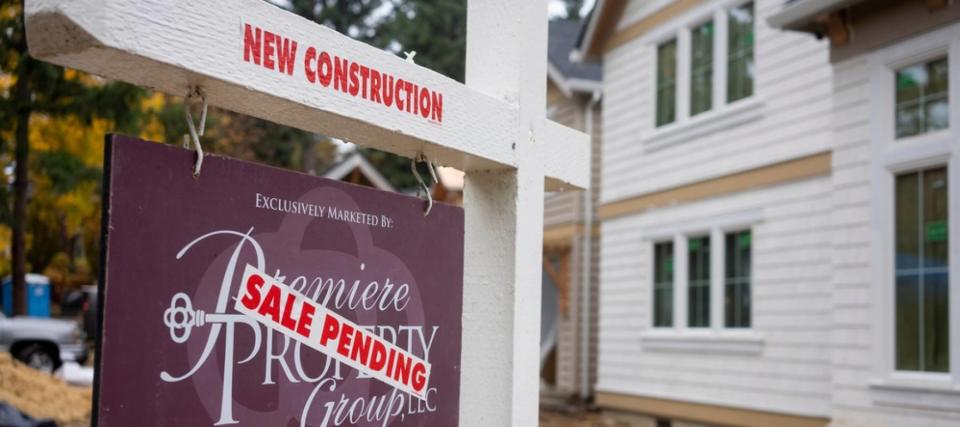Home buyers struggle to become owners, with investors snatching up nearly 30% of single-family homes in the US

Buying a home has become, well, completely out of reach for many. Increased demand combined with dwindling home supply, supply chain issues, and rising mortgage interest rates have all contributed to higher costs that have rendered homes unattainable for the average American.
To add fuel to the fire, one other major change has affected the cost of homes: the sharp increase in the share of homes being purchased by investors and hedge funds.
Don't miss
Commercial real estate has beaten the stock market for 25 years — but only the super rich could buy in. Here's how even ordinary investors can become the landlord of Walmart, Whole Foods or Kroger
Cost-of-living in America is still out of control — use these 3 'real assets' to protect your wealth today, no matter what the US Fed does or says
These 5 magic money moves will boost you up America's net worth ladder in 2024 — and you can complete each step within minutes. Here's how
CoreLogic reported that the investor share of U.S. home purchases rose to almost 29% as of December 2023. What’s more? That figure is projected to exceed a whopping 30% in 2024, according to analysts.
And then there’s the matter of rising interest rates, as the Federal Reserve has hiked rates 11 times since March 2022 to control post-pandemic inflation. One ugly outcome of this has been stubbornly high mortgage interest rates, which has then deterred some hopeful buyers from entering the market altogether. In turn, this has fueled the demand for rentals — and investors are taking advantage.
9 states have a home investor share of 30% or more
In some states, the share of homes being purchased by investors is through the roof. California ranked the highest at approximately 35%. However, there are eight other states with home investor shares of 30% or more for 2023, according CoreLogic’s analysis:
California (35%)
Georgia (34%)
New Mexico (33%)
Kansas (32%)
Texas (31%)
Nevada (31%)
Arizona (30%)
Tennessee (30%)
Utah (30%)
Investor ownership tends to hurt local housing markets as homes purchased by investors are treated as assets from which to profit. The practice of scooping up single-family homes just to rent them out is driving up the price of homes and rent, creating an increasingly unsustainable and continued housing shortage.
In addition, investor purchases of single-family homes in an already stagnant housing market are reducing the supply of the last remaining affordable homes for home buyers. Just like most buyers, investors target lower-priced properties whenever possible, especially as mortgage rates and home prices remain elevated.
The difference? Home buyers usually aren’t able to compete with all-cash offers that investors can make. As the housing market continues to heat up, increased demand will likely send prices higher and leave prospective homeowners with fewer options.
Advocates say that investors buying up single-family homes not only increases prices, but contributes to the worsening of housing supply. Now, some lawmakers are standing up and looking to take control of greedy hedge funds buying up single-family homes across the U.S.
Read more: Jeff Bezos and Oprah Winfrey invest in this asset to keep their wealth safe — you may want to do the same in 2024
How lawmakers are tackling the ‘Wall Street in housing’ issue
Last December, Democrats Rep. Adam Smith of Washington and Sen. Jeff Merkley of Oregon introduced a bill in Congress to end hedge fund control of Americans homes.
If passed, the law would ban hedge funds and similar investors from buying up and owning single-family homes by introducing measures like federal tax penalties for funds that own an excess of 100 homes and forcing hedge funds and investors to sell a designated percentage of their homes to families each year.
Smith and Merkely aren’t the only politicians sounding the alarm about the hedge fund housing crisis. Georgia Democrat Rep. Nikema Williams, along with Reps. Linda Sanchez and Adam Smith, has introduced similar legislation to Congress.
“If dwindling inventories of affordable housing weren’t enough, too many families in my district and across the country are facing outside competition from massive investment firms. When they think they are ready to make the leap to buying a home, they’re cut off at their ankles by investment firms,” Williams said, in a video posted on X.
State politicians are taking notice and acting as well — especially in California, the state ranked highest for investor-owned single-family homes. In February, Democratic Sen. Nancy Skinner introduced bill SB 1212, which, if passed, would prohibit an investment entity from leasing, acquiring, or purchasing, acquiring a single-family home or duplex in the state of California.
The issue has also drawn California Governor Greg Abbott’s attention. Late last year, Abbott took to Twitter to voice his concerns about how the increased competition for homes has been impacting Texans.
“I strongly support free markets. But this corporate large-scale buying of residential homes seems to be distorting the market and making it harder for the average Texan to purchase a home. This must be added to the legislative agenda to protect Texas families,” Texas Republican Gov. Greg Abbott posted on X.
What to read next
Car insurance premiums in America are through the roof — and only getting worse. But 5 minutes could have you paying as little as $29/month
‘Baby boomers bust': Robert Kiyosaki warns that older Americans will get crushed in the 'biggest bubble in history' — 3 shockproof assets for instant insurance now
The 5 most expensive mistakes in options trading and how to avoid them
This article provides information only and should not be construed as advice. It is provided without warranty of any kind.

 Yahoo Finance
Yahoo Finance 